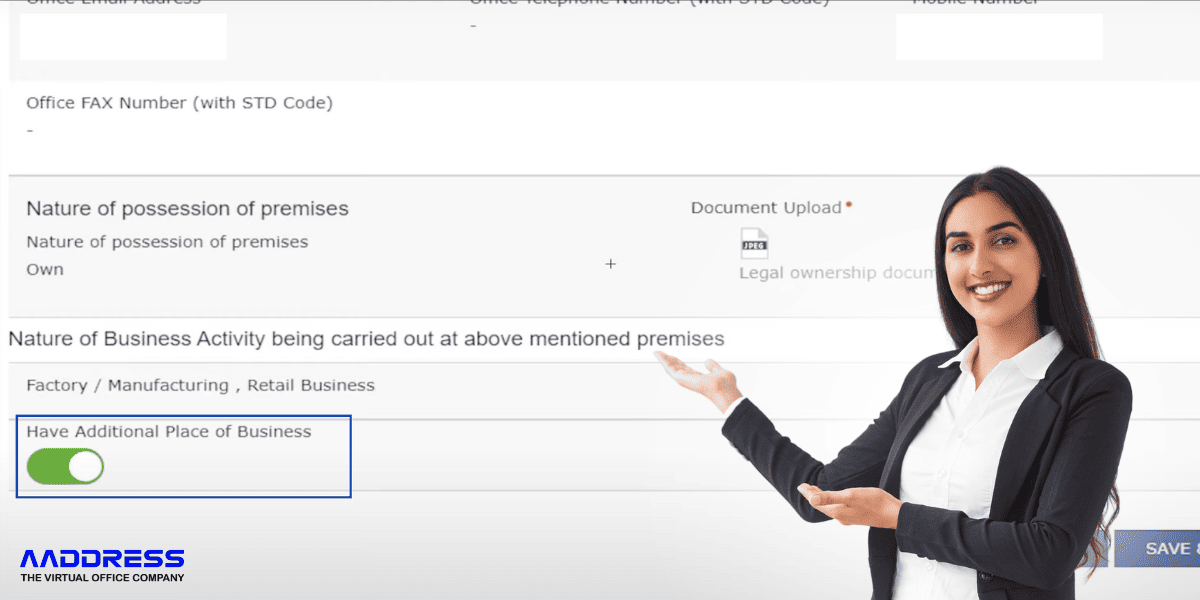Don’t just get a virtual office—let us help you build your business with our expert resources.Learn More
How to Open a Remote Company in India: A Step-by-Step Guide

Introduction
Is starting a business without a physical office even possible in today’s world? Can you truly manage a company remotely and still thrive in the competitive Indian market?
In a rapidly evolving business landscape, remote companies are becoming the new norm. With the rise of digital technology and global connectivity, India has emerged as a favorable destination for entrepreneurs looking to establish remote businesses.
From reduced operational costs to access to a vast talent pool, opening a remote company in India is not only feasible but also highly advantageous. This guide will walk you through the steps to establish a remote company in India while exploring the significance of virtual offices in streamlining operations.
Why Choose India for Your Remote Company?
India is a hub of innovation and opportunity, offering a favorable environment for remote businesses. Here are a few reasons to consider setting up your remote company in India:
- Cost Efficiency: Operating costs in India are significantly lower compared to Western countries.
- Talent Pool: India boasts a large and skilled workforce, especially in IT, marketing, and customer support.
- Technology Infrastructure: With a rapidly growing tech ecosystem, India provides robust digital solutions for remote operations.
- Government Initiatives: Policies like “Digital India” and “Startup India” encourage entrepreneurship and innovation.
- Time Zone Advantage: India’s time zone bridges the gap between Western and Eastern markets, enabling seamless communication.
10 Steps on How to Open a Remote Company in India
Step 1: Define Your Business Model
Before diving into the formalities, it’s crucial to define your business model. Ask yourself:
- What services or products will you offer?
- Who is your target audience?
- How will you manage operations remotely?
A clear business plan will serve as your roadmap, helping you make informed decisions as you proceed.
Step 2: Choose a Legal Structure
India offers several legal structures for businesses. The most common options for remote companies are:
- Private Limited Company: Ideal for startups looking for growth and investment opportunities.
- Limited Liability Partnership (LLP): Combines the benefits of a partnership and limited liability.
- Sole Proprietorship: Suitable for single-owner businesses with limited operations.
- One-Person Company (OPC): A hybrid structure for single entrepreneurs.
Consult a legal expert to select the structure that aligns with your business goals and operations.
Step 3: Register Your Company
Once you’ve decided on a structure, follow these steps to register your company:
- Obtain a Digital Signature Certificate (DSC): Required for filing online forms.
- Get a Director Identification Number (DIN): Mandatory for directors of the company.
- Reserve a Unique Name: Use the Ministry of Corporate Affairs (MCA) portal to check and reserve your company’s name.
- Incorporation Application: Submit Form SPICe+ through the MCA portal, including all required documents like the Memorandum of Association (MoA) and Articles of Association (AoA).
- GST Registration: If your business turnover exceeds the prescribed limit, register for Goods and Services Tax (GST).
Step 4: Set Up a Virtual Office
A virtual office is a cost-effective solution for remote companies. It provides:
- A Professional Business Address: Essential for registration and client communications.
- Mail Handling Services: Ensures smooth correspondence.
- Meeting Room Access: For occasional in-person meetings.
- Remote Receptionist Services: Enhances professionalism.
Step 5: Build a Remote Team
Your team is the backbone of your remote company. Here’s how to build and manage it effectively:
- Hire Skilled Professionals: Use platforms like LinkedIn, Naukri, and Upwork to find the right talent.
- Use Collaboration Tools: Leverage tools like Slack, Zoom, and Asana for seamless communication and project management.
- Set Clear Expectations: Define roles, responsibilities, and deliverables to avoid confusion.
- Foster a Positive Culture: Encourage regular virtual team-building activities and open communication.
Step 6: Leverage Technology
Technology is the lifeline of a remote business. Invest in tools that support:
- Project Management: Trello, Monday.com
- Time Tracking: Clockify, Hubstaff
- Customer Relationship Management (CRM): Zoho, Salesforce
- Accounting and Finance: QuickBooks, Tally
These tools will ensure efficiency and productivity in your operations.
Step 7: Comply with Taxation and Legal Requirements
To run a compliant business in India, adhere to:
- Income Tax Laws: File regular returns and pay applicable taxes.
- GST Compliance: Submit GST filings on time if registered.
- Labor Laws: If you have employees, comply with labor laws regarding wages, benefits, and working hours.
- Annual Filings: Submit necessary documents to the MCA annually.
Step 8: Market Your Business
A strong online presence is vital for remote companies. Focus on:
- Website Development: Create a professional and user-friendly website.
- Social Media Marketing: Use platforms like Instagram, LinkedIn, and Facebook to engage with your audience.
- Content Marketing: Publish blogs, articles, and case studies to establish authority.
- Email Marketing: Build a mailing list and communicate regularly with potential clients.
Step 9: Network and Collaborate
Even as a remote company, networking is key to growth. Participate in:
- Webinars and Online Events: Connect with industry leaders and peers.
- Startup Communities: Join groups like Nasscom and TiE for mentorship and resources.
- Collaborative Projects: Partner with complementary businesses to expand your reach.
Step 10: Monitor and Scale
Track your business’s performance and identify areas for improvement. Use analytics tools to:
- Measure website traffic and user engagement.
- Evaluate team productivity and efficiency.
- Assess financial health and ROI.
When the time is right, consider scaling your operations by:
- Expanding your team.
- Diversifying your offerings.
- Exploring international markets.
Challenges of Running a Remote Company in India
While remote companies have their advantages, they also come with challenges such as:
- Communication barriers.
- Time zone differences.
- Maintaining team cohesion.
Address these challenges with effective planning, the right tools, and consistent efforts to keep your team engaged.
Conclusion
Opening a remote company in India is a rewarding venture when done right. By leveraging technology, utilizing virtual offices, and adhering to legal requirements, you can establish a successful and scalable business.
Whether you’re a budding entrepreneur or an established professional, the potential to thrive in India’s dynamic market is immense.
Ready to turn your remote business dream into reality? Start today!
Subscribe To Our Newsletter
Conquer your day with daily search marketing news.
Most popular Blogs
Top 5 Locations in Delhi to Set Up Your Virtual Office
When you start a business in Delhi, there's always that one uncle or friend who...
Read Full ArticleReading Time: 5 min.How to Start Water Bottle Business in India: A Practical Guide
Starting a water bottle business in India can be a smart and rewarding move. ...
Read Full ArticleReading Time: 4 min.How to Add Additional Place of Business in GST Online (2025 Guide)
Adding an additional place of business in GST is mandatory for each business if they...
Read Full ArticleReading Time: .Low-Cost Business Ideas with High Profit
Introduction Starting your own business is becoming a popular choice for many people today....
Read Full ArticleReading Time: .



